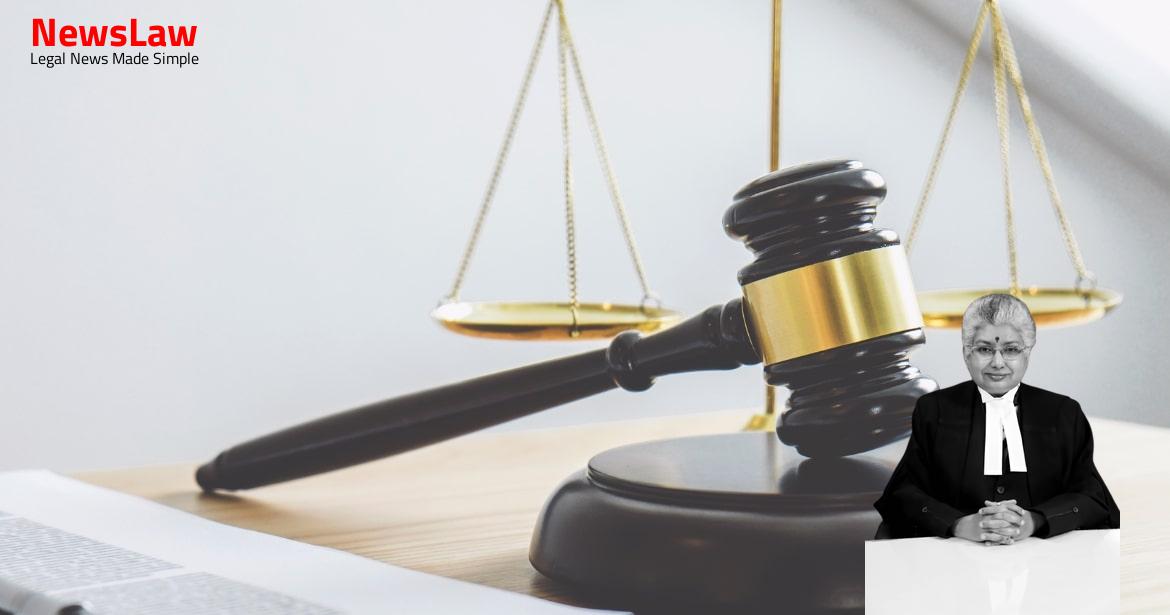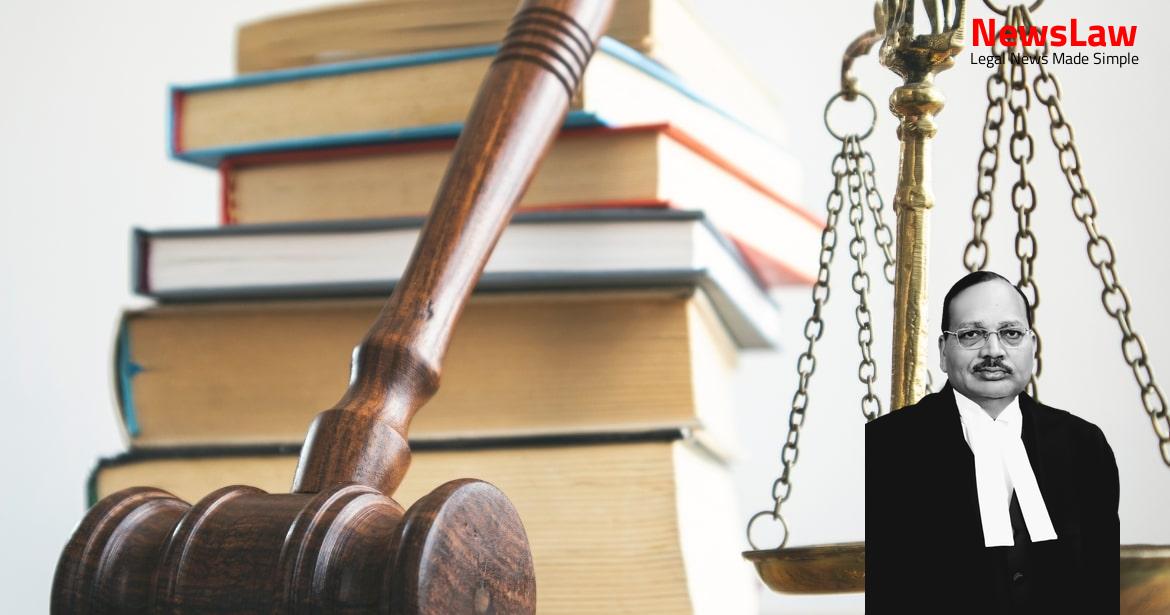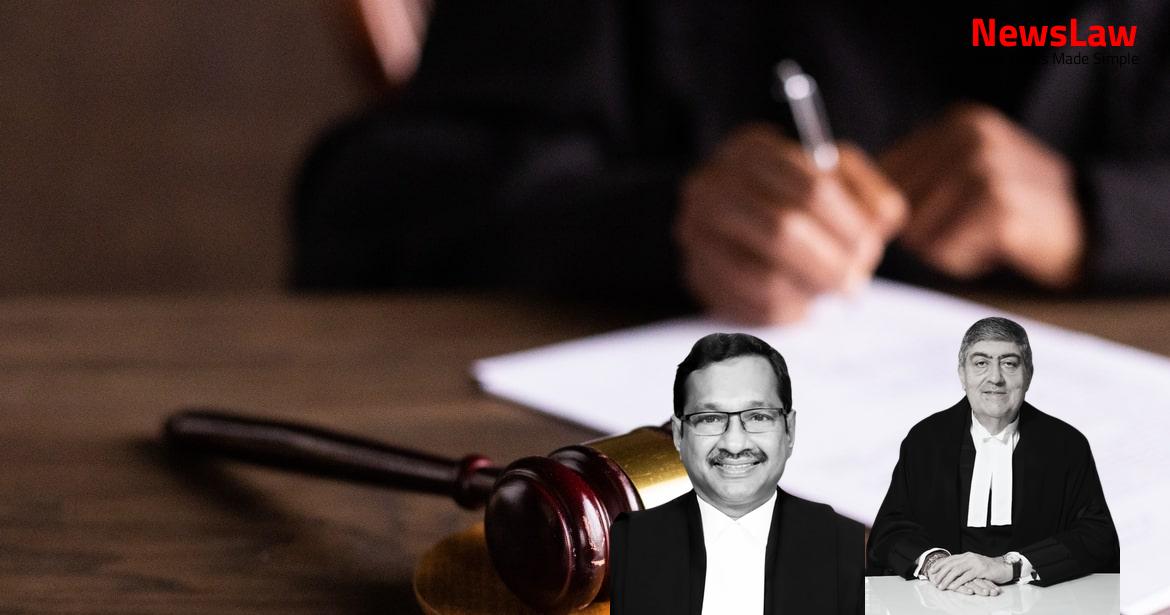In a recent case involving a land dispute, the court’s legal analysis was put to the test. The meticulous examination of witness testimonies, contradictions in evidence, and the scrutiny of related witnesses played a pivotal role in determining the final judgment. Let’s delve into the intricate details of how the court’s analysis shaped the outcome of this complex legal case.
Facts
- Accused No.1’s appeal was abated due to his death during the pendency of the appeals.
- Accused Nos. 4, 10, and 11 were sentenced to rigorous imprisonment for life for the offense under Section 302 read with Section 149 of the IPC.
- Accused persons intended to take possession of a land and prevent the ploughing by using weapons like lathi, fishing prong, falla, and surki.
- Accused Nos. 2, 3, 6, 7, and 8 were sentenced to various terms of imprisonment for different offenses which were to run concurrently.
- The Fast Track Court convicted only three out of eleven accused under Section 302 of IPC read with Section 149 of IPC, while the others were acquitted.
- The High Court refrained from questioning the acquittal since it was not challenged.
- The judgment and sentence passed by the Fast Track Court were upheld and affirmed for all accused appellants.
- An FIR/Ejahar was lodged by Md. Baju Mollik on 19.11.1999 at about 9:00 a.m. at Police Station, Barpeta.
- The FIR was registered as Case No. 1022/99 under Sections 147/148/149/447/323/324/307/302 IPC.
- The accused denied the alleged occurrence and claimed innocence.
- The prosecution examined ten witnesses.
- The altercation between Md. Baju Mollik and accused No.11 led to the attack by other co-accused with weapons.
- After investigation, a Charge Sheet was submitted and the case was committed to the Court of Sessions, Barpeta.
- The Fast Track Court convicted Md. Yunush Ali, Md. Hasan Ali, and Md. Omar Ali.
- The doctor’s reports indicated the deceased was killed at 7 or 8 a.m. and the FIR was promptly lodged.
- Statements of the accused under Section 313 of CrPC were recorded.
- The accused were armed with deadly weapons to prevent others from intervening.
- Charges were framed against the accused who pleaded ‘not guilty’.
- Some accused were granted bail on different dates.
- The accused also examined two witnesses in their defense.
- The case was initially before the Court of Sessions but transferred to the Fast Track Court, Barpeta.
Arguments
- Appellants-accused contend that the impugned judgments of the Courts are flawed and the findings are perverse.
- The appellants argue that there was no evidence of unlawful assembly, rioting, or murder.
- Learned counsel for the appellants insist that the High Court erred in upholding the conviction and sentence imposed by the Fast Track Court.
- Points for consideration in the appeal against the High Court’s decision to confirm the conviction and sentence of the accused by the Fast Track Court.
- Reviewing whether the High Court’s judgment warrants any modification or interference by this Court.
- Recalling the approach to be taken when deciding appeals against conviction by Trial Court and High Court.
- Absence of confirmation for the accused’s alibi by witnesses and the contention raised by the respondent-State’s counsel.
- Citing established principles on handling evidence discrepancies from various court judgments.
- The insufficient proof of the alibi claimed by the accused as argued by the respondent-State’s counsel.
- Relevance of Section 11 and Section 103 of the Evidence Act in proving an alibi.
- The necessity to prove alibi with absolute certainty to completely exclude the accused’s presence at the crime scene.
Also Read: SC Clarifies: Choice of Depreciation Method Allowed Until Return Filing
Analysis
- The evidence of the witnesses presented by both the prosecution and defense is analyzed for inconsistencies and contradictions.
- The credibility of related and interested witnesses is questioned due to material contradictions in their testimonies.
- The testimony of the first informant, PW-6, is found to be inconsistent with the testimonies of other witnesses, leading to doubts.
- Variations in witness accounts regarding who inflicted fatal injuries on the deceased Ekkabar Ali create uncertainty in the case.
- The Investigating Officer, PW-10, did not thoroughly verify land documents, raising questions about the investigation.
- Discrepancies and contradictions in the evidence provided by witnesses cast doubt on the prosecution’s case beyond a reasonable doubt.
- High Court’s reliance on inconsistent witness testimonies is deemed erroneous and leading to potential miscarriage of justice.
- The Courts failed to consider key principles of administration of criminal justice, like the presumption of innocence of the accused.
- The involvement of accused persons in the unlawful assembly and causing fatal injuries is subject to differing accounts and lack of conclusive evidence.
- The testimony of related witnesses should be analyzed with caution for credibility and a discerning scrutiny
- Concurrent findings of fact cannot be interfered with unless shown to be perverse
- Interested witness evidence should be meticulously and carefully examined, distinguishing between normal and material discrepancies
- The evidence of interested witnesses should be scrutinized with care but can be relied upon if found truthful
- Courts have to be cautious and meticulously evaluate evidence when only family members are present during an incident
- Related witnesses’ evidence needs to be considered with discerning scrutiny, especially when they are all related to each other
- High Court is entitled to appreciate oral evidence correctly if it was not done in the original judgment
- Conviction can be set aside if there are material contradictions in prosecution witnesses’ evidence
- The Court may interfere in cases of improper reception or rejection of evidence, misreading of vital evidence, or overlooking important points in favor of the accused
- Injuries caused to the prosecution witnesses were simple in nature as per medical reports.
- Vital discrepancies and inconsistencies in the evidence of prosecution witnesses were not considered by the High Court and Trial Court.
- High Court was not justified in reaffirming the conviction and sentencing by Fast Track Court.
- Session Court and High Court were not right in convicting and sentencing the appellants.
- Impugned judgments passed by High Court affirming the conviction and sentence by Fast Track Court were set aside.
- Re-appreciation of evidence showed unjustified affirmation of judgment of conviction by High Court for the first three appellants for life imprisonment.
- For the other appellants, simple imprisonment for one year was deemed inappropriate based on reports stating injuries were caused by a blunt weapon.
Decision
- Pending application(s) shall stand disposed of as per the terms mentioned above.
- The appellants are acquitted of all charges in the instant case.
- Charges levelled against the appellants are quashed and set aside.
Case Title: MD. JABBAR ALI Vs. THE STATE OF ASSAM (2022 INSC 1096)
Case Number: Crl.A. No.-001105-001105 / 2010



